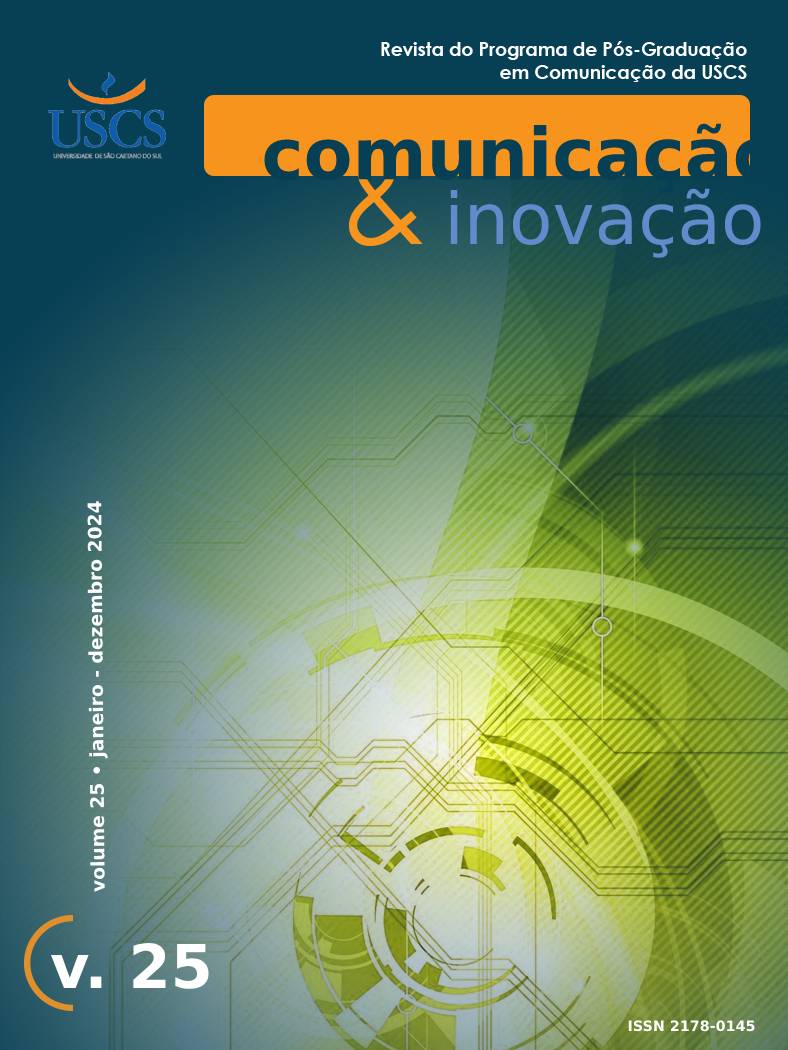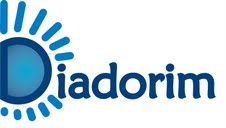A COMUNICAÇÃO DO AGRONEGÓCIO BRASILEIRO SE POSICIONA COMO GREENWASIHING?
DOI:
https://doi.org/10.13037/ci.vol25.e20249405Palavras-chave:
Greenwashing, fake news, sustentabilidadeResumo
Este artigo discute como a retórica multimodal encobre a disseminação de Fake News na forma de Greenwashing nos discursos de sustentabilidade do agronegócio. O levantamento realizado apontou que o setor por meio de alegações cativantes implícitas em uma retórica apoiada em universais abstratos camuflam as práticas efetivamente empregadas como responsabilidade social corporativa. Ao final da pesquisa são apresentados três pressupostos básicos que abordam as estratégias de desinformação do agronegócio em oposição aos princípios do Manifesto de Davos e às metas da Agenda ONU 2030.
Downloads
Referências
AMBRIZZI, T.; REHBEIN, A., DUTRA, L. M.; CRESPO, N. M. Mudanças climáticas e a sociedade. São Paulo, 2021. Disponível em: https://www.climaesociedade.iag.usp.br/livreto.pdf. Acesso em 16 dez. 2023.
ANTONIOLLI, G. O.; GONÇALVES-DIAS, S. L. F. G. Uma discussão em torno de responsabilidades, comunicação ambiental e greenwashing: o caso Petrobrás. Organizações e Sustentabilidade, n.3, v.1, p. 3-46, 2015 https://doi.org/10.5433/2318-9223.2015v3n1p3
BAZANINI, R. Estratégia competitiva: Pós-verdade e fake news no conflito Globo versus Universal-Record. Cia do eBook, 2021.
BLOME, C.; FOERSTL, K.; SCHLEPER, M. C. Antecedents of green supplier championing and greenwashing: An empirical study on leadership and ethical incentives. Journal of Cleaner Production, n. 152, p. 339-350, 2017. https://doi.org/10.1016/j.jclepro.2017.03.052.
BRÉCARD, D. Consumer misperception of eco-labels, green market structure and welfare. Journal of Regulatory Economics, n.51, v. 3, p. 340-364, 2017. https://doi.org/10.1007/s11149-017-9328-8.
DE FREITAS NETTO, S. V.; SOBRAL, M. F. F.; RIBEIRO, A. R. B.; SOARES, G. R. L. Concepts and forms of greenwashing: a systematic review. Environmental Sciences Europe, n. 32, v.1, 2020. https://doi.org/10.1186/s12302-020-0300-3 .
DELEUZE, G.; GUATTARI, F. Mil Platôs: capitalismo e esquizofrenia. São Paulo: Editora 34, v. 1, 1996.
DELMAS, M. A.; BURBANO, V. C. The Drivers of Greenwashing. California Management Review, n. 54, v. 1, p. 64-87, 2011. https://doi.org/10.1525/cmr.2011.54.1.64 Disponível em: https://rm.coe.int/information-disorder-toward-an-interdisciplinary-framework-for-researc/168076277c. Acesso em 16 dez 2023.
EMPRESA BRASILEIRA DE PESQUISA AGROPECUÁRIA - Embrapa. Brasil é o quarto maior produtor de grãos e o maior exportador de carne bovina do mundo, diz estudo, 2021. Disponível em: https://www.embrapa.br/busca-de-noticias/-/noticia/62619259/brasil-e-o-quarto-maior-produtor-de-graos-e-o-maior-exportador-de-carne-bovina-do-mundo-diz-estudo. Acesso em 12 dez. 2023
FELDMAN, L.; HART, P. S. Climate change as a polarizing cue: Framing effects on public support for low-carbon energy policies. Global Environmental Change, n. 51, p. 54-66, 2018. https://doi.org/10.1016/j.gloenvcha.2018.05.004.
FERNS, G.; AMAESHI, K. Fueling Climate (In) Action: How organizations engage in hegemonization to avoid transformational action on climate change. Organization Studies, n. 42, v. 7, p. 1005-1029, 2019 https://doi.org/10.1177/0170840619855744.
FOUCAULT, M. Em Defesa da Sociedade: curso no Collège de France (1975-1976). São Paulo: Martins Fontes, 2010.
GACEK, J. Corporate Greenwashing and Canada Goose: Exploring the Legitimacy-Aesthetic Nexus. International Journal for Crime, Justice and Social Democracy, n. 9, v. 4, p. 148-162, 2020. https://doi.org/10.5204/ijcjsd.v9i2.1385.
GRINBERG, N.; JOSEPH, K.; FRIEDLAND, L.; SWIRE-THOMPSON, B.; LAZER, D. Fake News on Twitter during the 2016 U.S. presidential election. Science, n. 363, p. 374-378, 2019. https://doi.org/10.1126/science.aau2706.
GUO, R.; TAO, L.; LI, C. B.; WANG, T. A Path Analysis of Greenwashing in a Trust Crisis Among Chinese Energy Companies: The Role of Brand Legitimacy and Brand Loyalty. Journal of Business Ethics, n. 140, v. 3, p. 523-536, 2017. https://doi.org/10.1007/s10551-015-2672-7.
INSTITUTO NACIONAL DE PESQUISAS ESPACIAIS-INPE. Programa Queimadas do IMPE. São José dos Campos, 2022. Disponível em https://queimadas.dgi.inpe.br/queimadas/bdqueimadas. Acesso em 16 dez. 2023.
IRETON, C.; POSETTI, J. Journalism, fake news & disinformation: handbook for journalism education and training. Unesco Publishing, 2018. Disponível em: https://unesdoc.unesco.org/ark:/48223/pf0000374458. Acesso em 16 dez 2023.
JONES, E. Rethinking Greenwashing: Corporate Discourse, Unethical Practice, and the Unmet Potential of Ethical Consumerism. Sociological Perspectives, n. 62, v. 5, p. 728-754, 2019. https://doi.org/10.1177/0731121419849095
KAPANTAI, E.; CHRISTOPOULOU, A.; BERBERIDIS, C.; PERISTERAS, V. A systematic literature review on disinformation: Toward a unified taxonomical framework. New Media & Society, n. 23, v. 5, p. 1301-1326, 2020. https://doi.org/10.1177/1461444820959296.
KHAN, A.; BROHMAN, K.; ADDAS, S. The anatomy of 'fake news': Studying false messages as digital objects. Journal of Information Technology, n. 37, v. 2, p. 122-143, 2021. https://doi.org/10.1177/02683962211037693
LACROIX, K.; GIFFORD, R.. Psychological Barriers to Energy Conservation Behavior: The Role of Worldviews and Climate Change Risk Perception. Environment and Behavior, n. 50, v. 7, p. 749-780, 2017. https://doi.org/10.1177/0013916517715296
LYON, T. P.; MAXWELL, J. W. Greenwash: Corporate Environmental Disclosure under Threat of Audit. Journal of economics & management strategy, n. 20, v. 1, p. 3-41, 2011. https://doi.org/10.1111/j.1530-9134.2010.00282.x.
LYON, T. P.; MONTGOMERY, A. W. The Means and End of Greenwash. Organization & Environment, n. 28, v. 2, p. 223-249, 2015. https://doi.org/10.1177/1086026615575332.
MACKAY, B.; MUNRO, I. Information Warfare and New Organizational Landscapes: An Inquiry into the ExxonMobil-Greenpeace Dispute over Climate Change. Organization Studies, n. 33, v. 11, p. 1507-1536, 2012. https://doi.org/10.1177/0170840612463318.
MARQUES, R. C. Discursos sobre a sustentabilidade na pecuária bovina promovidas pelos maiores frigoríficos brasileiros: um estudo de casos múltiplos. 113 f. Trabalho de Conclusão de Curso (Engenharia de Produção) - Escola de Engenharia de São Carlos, São Carlos, 2022.
MARQUIS, C.; TOFFEL, M. W.; ZHOU, Y. Scrutiny, Norms, and Selective Disclosure: A Global Study of Greenwashing. Organization Science, n. 27, v.2, p.483-504, 2016. https://doi.org/10.1287/orsc.2015.1039.
MATEJEK, S.; GÖSSLING, T. Beyond Legitimacy: A Case Study in BP's "Green Lashing.". Journal of Business Ethics, n. 120, v. 4, p. 571-584, 2014. https://doi.org/10.1007/s10551-013-2006-6.
NAÇÕES UNIDAS BRASIL. Metas da Agenda 2030. Brasília - DF, 2015. Disponível em: https://brasil.un.org/pt-br/91863-agenda-2030-para-o-desenvolvimento-sustent%C3%A1vel Acesso em 16 dez. 2023
PAGOTTO, E. L.; BERNARDINO DE CARVALHO, M. Natureza à venda: da ecopornografia a um modelo compreensivo de indicadores de greenwashing. Scripta Nova, n. 24, 2020. https://doi.org/10.1344/sn2020.24.22685.
PASSARINHO, N. Como a carne virou 'vilã' em mudança climática e entrou na mira da COP26. BBC News Brasil, Geral. 8 novembro 2021. Disponível em: <https://www.bbc.com/portuguese/geral-59201457> Acesso em: 19/07/2023.
PIZZETTI, M.; GATTI, L.; SEELE, P. Firms Talk, Suppliers Walk: Analyzing the Locus of Greenwashing in the Blame Game and Introducing 'Vicarious Greenwashing.' Journal of Business Ethics, n. 170, v. 1, p. 21-38, 2021. https://doi.org/10.1007/s10551-019-04406-2
RAHMANIAN, E. Fake News: a classification proposal and a future research agenda. Spanish Journal of Marketing - ESIC, n. 27, v. 1, p. 60-78, 2023. https://doi.org/10.1108/sjme-09-2021-0170
SIANO, A.; VOLLERO, A.; CONTE, F.; AMABILE, S. "More than words": Expanding the taxonomy of greenwashing after the Volkswagen scandal. Journal of Business Research, n. 71, p. 27-37, 2017. https://doi.org/10.1016/j.jbusres.2016.11.002
SILVA, C. F. S. da A Retórica Multimodal nas Fake News (dissertação de Mestrado. Recife, Universidade Federal de Pernambuco, 2023
TATEISHI, E. Craving gains and claiming "green" by cutting greens? An exploratory analysis of greenfield housing developments in Iskandar Malaysia. Journal of Urban Affairs, n. 40, v. 3, p. 370-393, 2018. https://doi.org/10.1080/07352166.2017.1355667
VAN DER LINDEN, S. The social-psychological determinants of climate change risk perceptions: Towards a comprehensive model. Journal of Environmental Psychology, n. 41, p. 112-124, 2015. https://doi.org/10.1016/j.jenvp.2014.11.012.
VILANOVA, M.; LOZANO, J. M.; ARENAS, D. Exploring the Nature of the Relationship Between CSR and Competitiveness. Journal of Business Ethics, n. 87, p. 57-69, 2008. https://doi.org/10.1007/s10551-008-9812-2.
WARDLE, C. The Need for Smarter Definitions and Practical, Timely Empirical Research on Information Disorder. Digital Journalism, n. 6, v.8, p.951-963, 2018. https://doi.org/10.1080/21670811.2018.1502047.
WARDLE, C.; DERAKHSHAN, H. Information disorder: Toward an interdisciplinary framework for research and policy making. Council of Europe Report, n. 27, 2017.
WEF - World Economic Forum. The Davos Manifesto, 2020. Disponível em: https://www.weforum.org/the-davos-manifesto. Acesso em: 20 de maio de 2023.
WITTNEBEN, B. B. F.; OKEREKE, C.; BANERJEE, S. B.; LEVY, D. L. Climate Change and the Emergence of New Organizational Landscapes. Organization Studies, n. 33, v. 11, p. 1431-1450, 2012. https://doi.org/10.1177/0170840612464612
YANG, Z.; NGUYEN, T. T. H.; NGUYEN, H. N.; NGUYEN, T. T. N.; CAO, T. T. Greenwashing behaviours: Causes, taxonomy and consequences based on a systematic literature review. Journal of Business Economics and Management, n. 21, v. 5, p. 1486-1507, 2020. https://doi.org/10.3846/jbem.2020.13225
ZHOU, X.; ZAFARANI, R. A Survey of Fake News. ACM Computing Surveys, n. 53, v. 5, p. 1-40, 2020. https://doi.org/10.1145/3395046.
Downloads
Publicado
Edição
Seção
Licença
Direitos autorais (c) 2024 Roberto Bazanini, Miguel Eugenio Minuzzi Vilanova, Alexandre Garcia de Farias, Celso Machado Júnior, Márcia Eleane Braghini Deus Deu

Este trabalho está licenciado sob uma licença Creative Commons Attribution-NonCommercial-NoDerivatives 4.0 International License.
Conforme consta nas normas da revista, o envio de artigos e textos solicitando a apreciação com a finalidade de publicação na Comunicação & Inovação, configura a cessão de direitos autorais.
No caso de fotos e imagens, o autor deve providenciar documento que ateste a permissão em termos de direitos autorais.





